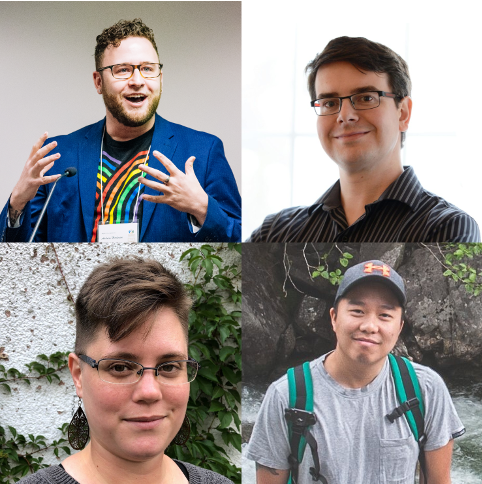Hello! We are Andrew Hartman, Brian Hoessler, Carolyn Camman and Vincent Tom – 2SLGBTQ evaluators from upper Turtle Island located throughout Western Canada. We’ve been exploring how our identities inform how we navigate our evaluation work as part of a submission for an upcoming journal issue on 2SLGBTQ evaluators and evaluation. Existing as queer has taught us how to enter and safely navigate new contexts while considering and viewing spaces from different viewpoints. We hope sharing some of our reflections informs you on bringing this approach into your praxis.

Identity shapes how we enter and conduct ourselves within spaces, subconsciously and consciously. Any evaluator can learn to be consciously aware of and attentive to the dimensions and implications of one’s identity, but as queer folx we had to learn to navigate our identities due to dominant cis-heteronormativity, which can be invisible to those not directly affected.
The subjectivity of identity is often diminished compared to positivist standpoints that uphold unpositioned objectivity as a core value. However, the value of decontextualized objectivity is being questioned within and outside of evaluation. Indigenous journalist Candis Callison critiqued objectivity as ‘the view from nowhere’, an impossible position whose pursuit results in harm. Similar critiques have been raised repeatedly within evaluation. Indigenous evaluator Nicole Bowman instructs us on the importance of telling our origin stories. Cyndi Suarez, senior editor of the Nonprofit Quarterly, points out that ‘decontextualizing is a dominant power strategy’. As evaluators, our role is to help put things into context. How can we do that without putting ourselves in context?
Our queer approach to evaluation embraces living our truths and allowing our wholeness to emerge. This requires understanding our histories, intersections, and relations to community. As evaluators we cannot simply remove ourselves from our contexts, only dissociate from them. A queer approach thus embraces complexity and context to allow for more rigorous evaluations.
Hot Tips:
- Reflect on your identities – What are my identities? How do they inform, strengthen, and hinder my approach to evaluation?
- Get curious and question everything – How do I hold myself? How do I show up? How do others perceive me? How do these answers shape my interactions?
- Explore your roots – Where do I come from? And how does my journey and history shape me? What strengths do my roots provide me?
Rad Resources:
- Moray, P. Episode 39: Your trans ancestors and elders hold your activist tender heart. Bespoken Bones Podcast. November 28, 2018. https://bespokenbones.com/episode-39-your-trans-ancestors-and-elders-hold-your-activist-tender-heart/
- Bowman-Farrell NR. Nation-to-Nation Evaluation: Governance, Tribal Sovereignty, and Systems Thinking through Culturally Responsive Indigenous Evaluations. Canadian Journal of Program Evaluation. 2019;34(2). doi:10.3138/cjpe.67977
- Asakura, K. (2017), Paving Pathways Through the Pain: A Grounded Theory of Resilience Among Lesbian, Gay, Bisexual, Trans, and Queer Youth. J Res Adolesc, 27: 521-536. doi:10.1111/jora.12291
The American Evaluation Association is celebrating LGBT TIG Week with our colleagues in the Lesbian, Gay, Bisexual & Transgender Issues Topical Interest Group. The contributions all this week to aea365 come from our LGBT TIG members. Do you have questions, concerns, kudos, or content to extend this aea365 contribution? Please add them in the comments section for this post on the aea365 webpage so that we may enrich our community of practice. Would you like to submit an aea365 Tip? Please send a note of interest to aea365@eval.org. aea365 is sponsored by the American Evaluation Association and provides a Tip-a-Day by and for evaluators.

Hello Andrew, Brian, Carolyn and Vincent,
Wow… I was really touched personally by your post as identity is something I have been struggling with lately.
I believe your post addresses a bias in evaluation that evaluators may not consider; the bias of assuming a cis-heteronormative only view of the world and program being evaluated.
When collecting qualitative data for evaluations we should be encouraging participants to be who they are; if they are pretending to be someone else it will skew the data being presented to meet a cis-heteronormative dominated world. Your ‘Hot Tips’ resonate with me personally and as someone new to evaluation. To understand what our identities and roots are can identify our own biases we bring to our evaluation, consciously or subconsciously.
By understanding how, as evaluators, our experiences, roots, and way of identifying oneself may differ from that of the people we are collecting data from can offer a new means of analyzing the data collected. By assuming everyone fits the cis-heteronormative world will not only make it difficult for 2SLGBTQ+ individuals to truly participate honestly but skew the data as a cis-heteronormative perspective is used to interpret 2SLGBTQ+ data. As you stated, “As evaluators, our role is to help put things into context. How can we do that without putting ourselves in context.”
As a starting point, do you purpose that when conducting evaluations, we ask participants how they choose to identify themselves to begin to better understand their viewpoint?
It is great that a spotlight is being placed on 2SLGBTQ+ within evaluation. Thank you for your post and contribution.
Yours Truly,
Samantha Chin (she/her)